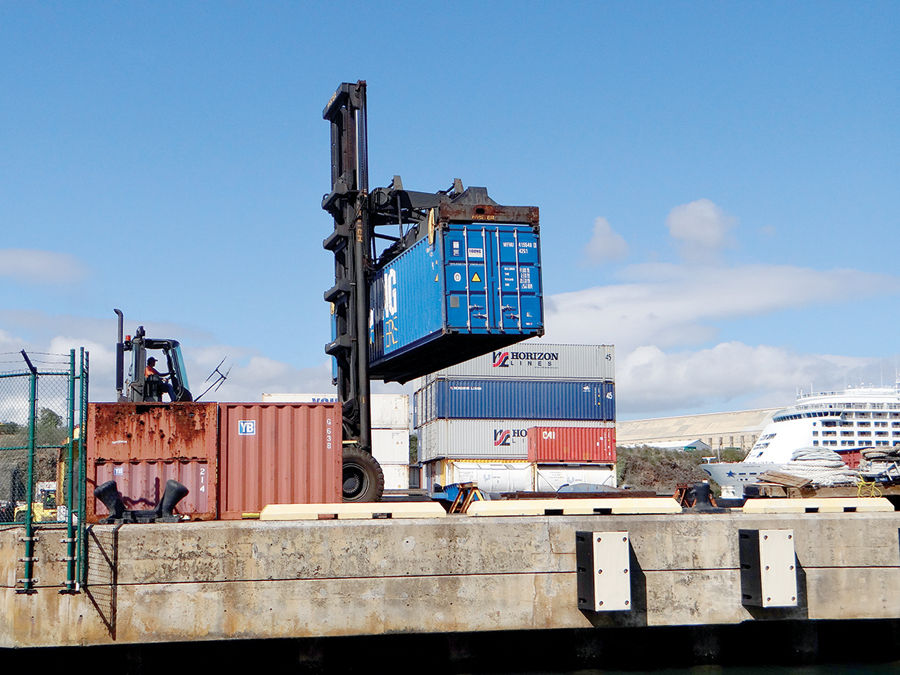LIHUE — A West Coast labor dispute affects Hawaii, but officials say now is not the time to sound the alarm. Contract negotiations between Pacific Maritime Association and the International Longshore and Warehouse Union are in federal mediation. Leaders say talks are nearly
LIHUE — A West Coast labor dispute affects Hawaii, but officials say now is not the time to sound the alarm.
Contract negotiations between Pacific Maritime Association and the International Longshore and Warehouse Union are in federal mediation. Leaders say talks are nearly finished and an agreement is in sight for 20,000 dockworkers at 29 West Coast ports.
Negotiation has been bumpy, though, and West Coast ports re-opened Monday after employers closed the docks for two days.
ILWU blamed employer-caused congestion throughout 2014 for the current situation but wants the ports kept open.
“We’ve dropped almost all of our remaining issues to help get this settled – and the few issues that remain can be easily resolved,” ILWU President Robert McEllrath said in a statement. “Closing the ports at this point would be reckless and irresponsible.”
As the dispute continues, Hawaii has already been affected by the slowdown. But even if negotiations aren’t hashed out and workers strike, geographically isolated Hawaii could issue a governor’s exemption, meaning the strike wouldn’t affect cargo needed to go to the islands.
“There is no strike. There have been work slowdowns but there is no strike,” said Jeff Hull, Matson spokesman. “The situation is still fluid. The process has been going on for eight months and we will see if there is a lockout or a strike.”
As one of the largest shippers into Hawaii, Hull said the company has seen a general slowdown due to the dispute. But, he added, there’s no reason to believe it will come to a stop. Domestic carriers tend to have priority, and they kept working even during this past weekend’s shutdown. A lockout affects domestic carriers for days whereas they can affect international carriers for weeks.
When a 2002 lockout resulted in a shutdown, Hawaii Gov. Ben Cayetano sent a letter to illustrate Hawaii’s dependance on shipping and cargo was moving again four days later. If a lockout were to occur now, Matson would request an exemption request for Hawaii, Hull said.
U.S. Sens. Mazie Hirono and Brian Schatz stated they are monitoring the situation and in contact with both sides at the bargaining table. A delegation exemption request letter for Hawaii is ready to go if needed.
In the latest twist, companies that run marine terminals locked out the majority of dockworkers Thursday. Employers didn’t call crews to operate the towering cranes that hoist cargo on and off ships.
The partial lockout also is planned for Saturday, Sunday and Monday. Each is either a holiday or weekend for which employers would have to pay dockworkers extra — and with a contract dispute, that is not going to happen.
Adding to Hawaii’s shipping concern is the loss of one of three weekly Matson container vessels.
Matson reported Monday that the vessel Maunawili sustained structural damage during a storm while en route from China to Long Beach. Repairs were expected to last until Sunday, forcing container transfer to another ship leaving four days later.
Earl Kashiwagi, owner of Esaki’s Produce of Kapaa, said the slowdown effects are happening, but that the negotiation process follows a predictable process. No deals are accepted initially and negotiations will start and stop until they are in mediation and something happens.
“It is in fact like negotiating with a foreign country, where it is almost an insult to accept the first offer,” he said.
More is going on behind the scenes to ensure product gets to Kauai than people realize, Kashiwagi said. Produce and other perishables tend to have priority and will be among the first things loaded, he said.
When necessary, Esaki’s will take the hit and charter an Aloha Airlines flight if a container shipment is canceled. The option of waiting a week for another barge means that produce is two weeks old and deteriorating by the times it reaches the customers. Scheduling delays occur even without a strike without anyone noticing, he said, so the worst thing to happen now is for people to start hoarding.
“Produce will always keep flowing one way or another, if not by boat, then we fly it over,” Kashiwagi said.
Cargo began moving slowly across the troubled West Coast waterfront months ago. Containers that used to take two or three days to hit the highway have been taking a week or more.
Some importers have reacted by diverting shipments to ports on the East and Gulf coasts. Others have turned to air cargo, paying a premium that can be five or more times more than the cost of sea-borne shipments.
Pasha Group ships civilian and military vehicles to Hawaii from San Diego, and plans to start container shipping with its Horizon purchase at some point, but said it hadn’t been impacted yet.
With so many variables left to sort out, others said the best approach may be to wait and see.
First Hawaiian Bank economist Jack Suyderhoud said any impact depends on a number of factors, from the length of a strike to the depth of the supply chain already at island warehouses.
“There are so many unknowns here that it is hard even to speculate,” Suyderhoud said.
In recent days, the union said companies are exaggerating the extent of congestion so they can cut dockworker shifts and pressure negotiators into a contract agreement.
Negotiations resumed Thursday in San Francisco — the first day the two sides have met since Feb. 6 — amid increasing pressure from elected officials and businesses to reach a deal.


